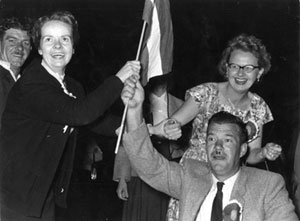- 1910
- First general election that followed the establishment of the Union of South Africa. Only White males had the right to vote.
- 1915
- Second general election in which the main issue was South Africa’s participation in World War I.
- 1920
- The post WWI crisis shaped the conduct and outcome of this election. The National Party of Hertzog, formed in 1914, won the most seats, forcing the South African Party into a Fusion with the Unionist Party, and the latter being disbanded.
- 1923
- This election was forced on the government by the expression of no confidence in Smuts’s policies. The outcome led to a PACT between the National Party and the Labour Party.
- 1929
- This election was centred on strategies of dealing with the crisis occasioned by the Great Depression. It led to the collapse of the PACT government and the National Party won the election.
- 1933
- The SAP which had become the UP and the National Party formed a Coalition that governed until the outbreak of Worlds War II in 1939.
- 1938
- The war issue was the focus of this election. The majority of white voters seemed to agree with South Africa’s participation in the war, leading to Hertzog and his National Party being marginalized. It also marked the beginning of the end of Hertzog’s political career.
- 1943
- The UP led by Smuts once again won the lection but the National Party showed signs of growing.
- 1948
- The historic election that brought the party of Apartheid policies, the Nationalist Party to power.
- 1953
- An election that returned the NP to power, emboldening it to pass some of the most draconian measures of the decade.
- 1958
- This is an election that made the architect of apartheid, H. F. Verwoerd the Prime Minister.
 Celebrating Republic Day 1961 © Bailey's Archives.
Celebrating Republic Day 1961 © Bailey's Archives.
- 1961
- The referendum that followed the Sharpeville massacre and whose outcome made South Africa a republic.
- 1966
- The NP refining and strengthening apartheid policies and winning elections an increasingly marginalized English opposition parties.
- 1983
- The election that followed the NP government’s decision to co-opt Coloureds and Indians into government, and reforming local government in respect of Africans.
- 1989
- Following the major political crisis of the 1980s, the NP government went into its last election as a ruling party and won the majority of seats.
- Summary of the South African House of Assembly election results, 1989
Parties Votes % +/- Seats +/- National Party 1 039 704 48.2% -4.1% 103 -21 Conservative Party 680 131 31.5% +4.9% 41 +19 Democratic Party 431 444 20.0% +6.0%* 34 +14* HNP 5 416 0.2% -2.7% 0 ±0 Total 2 157 593 100% 178 +11 - 1994
- The first non racial democratic elections held in post apartheid South Africa with Nelson Mandela being elected as President.
- 1999
- The second non racial democratic election in South Africa and Thabo Mbeki’s first term as President.
- 2004
- Third democratic elections and Mbeki’s second term.
- 2009
- Third democratic elections that brought about Jacob Zuma’s Presidency.